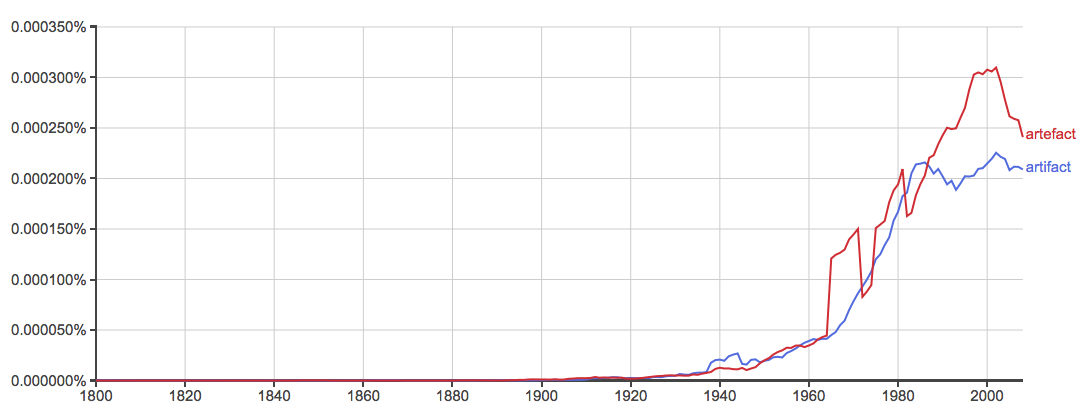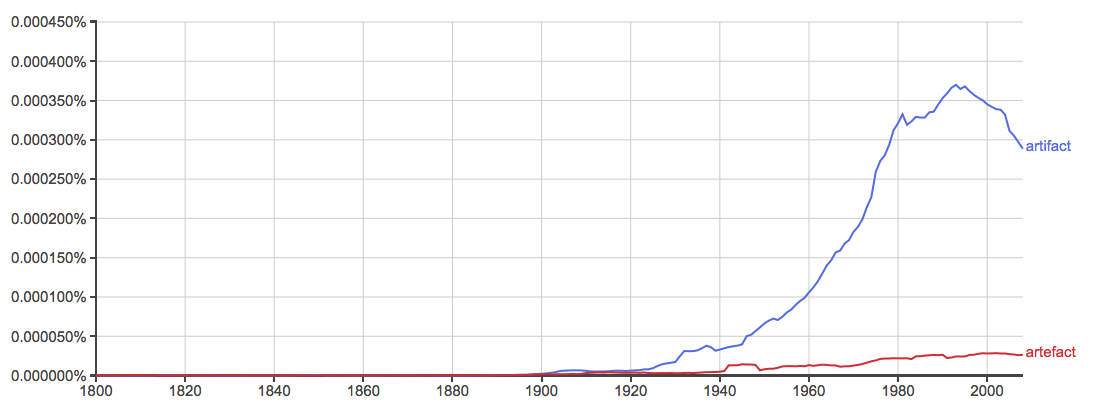While exploring ancient ruins and forgotten temples, archaeologists and adventures love to stumble upon relics of a long-dead culture.
Some of these objects have incredible cultural significance, while others are worth huge sums of money to collectors. Some are merely trinkets or curios to be displayed on a shelf, and serve as conversation pieces.
There is a word for such objects, but how should it be spelled? Some writers prefer artefact, while others use artifact.
Like many such differences, this one can be attributed to spelling conventions in British and American English. British writers prefer one spelling, and Americans use the other. Continue reading to discover who uses which word.
What is the Difference Between Artefact and Artifact?
In this article, I will compare artefact vs. artifact. I will also provide example sentences for each spelling and show you a helpful trick to use when choosing artefact or artifact for your writing.
When to Use Artefact
 What does artefact mean? An artefact is a man-made object of cultural or historical significance. This word is a noun.
What does artefact mean? An artefact is a man-made object of cultural or historical significance. This word is a noun.
For example,
- The artefact is on display at the art museum.
- French historical theme park Le Puy du Fou bought the 15th-century gold-plated silver ring at auction in London in February for £300,000 but was told after it had arrived in France that it had not obtained the necessary export licence for a historical artefact. –The Guardian
It is also used in a much broader sense to refer to byproducts of a complex process that appear in a finished product. Artefacts can show up in data sets, in digitally manipulated imagery, and in manufactured goods, among other places.
In this sense, the word is used like this,
- Detective Smolinski knew that the photo had been altered, because he could see digital artefacts in the image.
When to Use Artifact
 What does artifact mean? Artifact carries the same meaning as artefact. They are two different spellings of the same word. Artifact is the standard form in American English, but it is also widely used in British English.
What does artifact mean? Artifact carries the same meaning as artefact. They are two different spellings of the same word. Artifact is the standard form in American English, but it is also widely used in British English.
- The company behind the “Titanic” traveling exhibitions is suing France in hopes of winning approval to sell French artifacts from the famous shipwreck. –The Wall Street Journal
As you can see from the following chart, it isn’t just American writers that use artifact. British writers use both spellings, but there is a slight preference for artefact.

The above chart only references British English books written since 1800, so it’s not comprehensive by any means. Still, it illustrates the preference for artefact in British English.
In American English, however, the story is quite different. As you can see from the below chart that graphs artefact vs. artifact in American English, there is a strong preference for artifact.

If you are writing for an American audience, you will want to use the spelling artifact.
Trick to Remember the Difference
Here is a helpful trick to remember artifact vs. artefact.
- American English users prefer artifact.
- British English users prefer artefact, although they sometimes use artifact as well.
Artefact and England share the letter E, so remembering that artefact is primarily used in British English should be an easy task.
To simplify things even further, you could default to artifact in all contexts, since the British also use that variant. On the other hand, you should strive to use language intentionally, so if you know you will be writing for a primarily British audience, you will enhance your writing by using artefact.
Summary
Is it artefact or artifact? Artefact and artifact are two versions of the same noun. They are only differentiated by the communities in which they are used. Both spellings refer to a man-made object of cultural or historical significance.
- Artefact is the British English spelling.
- Artifact is the American English spelling.
You can remember to use artefact with British audiences since artefact and England both contain the letter E. Stick with artifact for American audiences.
Now you know whether you should choose artifact or artefact, depending on your intended audience. Be sure to check this site for other questions about word choice and writing in general.
Contents
